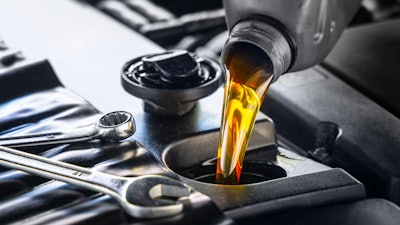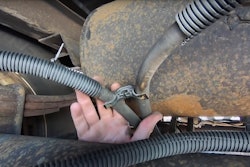
With new emissions regulations kicking off for model year 2027, and the hardware pushed to close to its technological limits, it’s time for engine oils to play a role.
Here's a breakdown of trucking's journey to PC-12.
The new oils were first proposed by the Truck and Engine Manufacturers Association (EMA) in 2021, when it asked the American Petroleum Institute (API) for the development of a new diesel engine category to help it manage new, more stringent emissions regulations and engine wear demands.
The new category, PC-12, will replace the PC-11 oils available now, CK-4 and FA-4.
[RELATED: API engine oil certification system updated]
Jeffrey Harmening, a senior project manager for EOLCS/DEF at API, says some of the things the OEMs wanted to see in the new oils included increased oxidation resistance, new engine wear test capabilities, lower viscosities to include SAE xW-20 in the F subcategory, reduced sulfated ash to improve the efficiency of diesel particulate filters, the improved protection of the catalyst as part of the exhaust gas aftertreatment, and new seal elastomers to ensure compatibility with the proposed oils.
Developing a better oil
Greg Matheson, commercial lubricants product manager at Lubrizol, an additives company, says developing new oils are about balance as companies reformulate their oils to meet OEM demands and new regulations.

“It’s a bit of an open box,” Matheson says. “The key to this development is how we can clearly show that value to the end user. It’s going to give them improved fuel efficiency, which translates into money.”
Petro-Canada Lubricants says the expected lower viscosity of PC-12 oils will reduce drag within the engine along with pumping and rotational issues to improve efficiency. It says there may even be an oil as light as SAE 0W-20 for heavy duty. The company has already completed an operational field trial with a 0W-20 prototype.
Over the next year, the industry will be finalizing chemistry, limits and tests for PC-12 oils, Matheson says. Companies are experimenting with chemical levels and developing tests and metrics the whole industry can shoot for.
Benefits of PC-12
At Shell, the Rotella engine oils are being reformulated for the new category. Karin Haumann, OEM technical services manager for Shell Global Solutions and the chairwoman of the API New Category Development Team creating PC-12 specifications, said the new oil will be an improvement.
“The new category is being requested with the following improvements beyond the current API CK-4 and FA-4 specifications: increased oxidation performance, new wear test capability, the addition of lower oil viscosities to include xW-20 in the F subcategory, improved aftertreatment capability, and the expansion of engine elastomer compatibility,” she says.
API’s Harmening says there may also be some other benefits to the new oil, including enabling new engine technologies that are expected to experience higher brake mean effective pressure and customer demands.
Using PC-12 in shops
Harmening says shops should make sure to upgrade their storage space for the new oils and ensure techs know when to use them to avoid potentially costly engine damage.
“Be sure to mark tanks, storage, tools, etc. to avoid comingling different products and misapplication,” Harmening says. “When PC-12 engine oils become available, it will be a good time for shops to reassess the need for all the oils they stock and eliminate older oils that may no longer be necessary. Also, evaluate specific viscosity grades and adjust inventory to ensure [you’re] stocking the proper supply of the most used oils. If you plan to make changes, set a specific date and clearly communicate this information to staff to align everyone on the proper procedures in place to properly store and handle multiple engine oils.”










